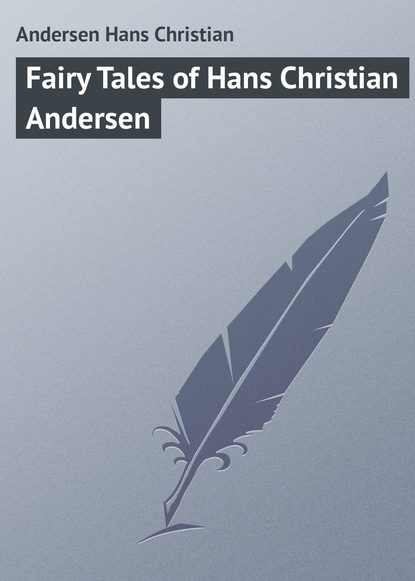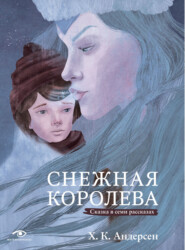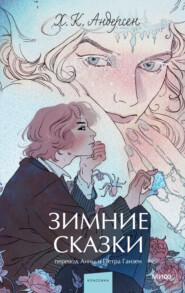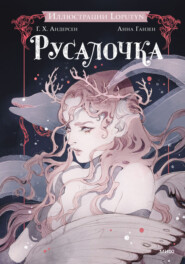По всем вопросам обращайтесь на: info@litportal.ru
(©) 2003-2024.
✖
Fairy Tales of Hans Christian Andersen
Настройки чтения
Размер шрифта
Высота строк
Поля
"Yes, she is innocent," said the eldest brother; and then he related all that had taken place; and while he spoke there rose in the air a fragrance as from millions of roses. Every piece of faggot in the pile had taken root, and threw out branches, and appeared a thick hedge, large and high, covered with roses; while above all bloomed a white and shining flower, that glittered like a star. This flower the king plucked, and placed in Eliza's bosom, when she awoke from her swoon, with peace and happiness in her heart. And all the church bells rang of themselves, and the birds came in great troops. And a marriage procession returned to the castle, such as no king had ever before seen.
THE WILL-O-THE WISP IS IN THE TOWN, SAYS THE MOOR WOMAN
There was a man who once knew many stories, but they had slipped away from him – so he said. The Story that used to visit him of its own accord no longer came and knocked at his door. And why did it come no longer? It is true enough that for days and years the man had not thought of it, had not expected it to come and knock; and if he had expected it, it would certainly not have come; for without there was war, and within was the care and sorrow that war brings with it.
The stork and the swallows came back from their long journey, for they thought of no danger; and, behold, when they arrived, the nest was burnt, the habitations of men were burnt, the hedges were all in disorder, and everything seemed gone, and the enemy's horses were stamping in the old graves. Those were hard, gloomy times, but they came to an end.
And now they were past and gone – so people said; yet no Story came and knocked at the door, or gave any tidings of its presence.
"I suppose it must be dead, or gone away with many other things," said the man.
But the story never dies. And more than a whole year went by, and he longed – oh, so very much! – for the Story.
"I wonder if the Story will ever come back again and knock?"
And he remembered it so well in all the various forms in which it had come to him, sometimes young and charming, like spring itself, sometimes as a beautiful maiden, with a wreath of thyme in her hair, and a beechen branch in her hand, and with eyes that gleamed like deep woodland lakes in the bright sunshine.
Sometimes it had come to him in the guise of a peddler, and had opened its box and let silver ribbon come fluttering out, with verses and inscriptions of old remembrances.
But it was most charming of all when it came as an old grandmother, with silvery hair, and such large, sensible eyes. She knew so well how to tell about the oldest times, long before the princesses spun with the golden spindles, and the dragons lay outside the castles, guarding them. She told with such an air of truth, that black spots danced before the eyes of all who heard her, and the floor became black with human blood; terrible to see and to hear, and yet so entertaining, because such a long time had passed since it all happened.
"Will it ever knock at my door again?" said the man, and he gazed at the door, so that black spots came before his eyes and upon the floor; he did not know if it was blood, or mourning crape from the dark heavy days.
And as he sat thus, the thought came upon him whether the Story might not have hidden itself, like the princess in the old tale. And he would now go in search of it; if he found it, it would beam in new splendor, lovelier than ever.
"Who knows? Perhaps it has hidden itself in the straw that balances on the margin of the well. Carefully, carefully! Perhaps it lies hidden in a certain flower – that flower in one of the great books on the book-shelf."
And the man went and opened one of the newest books, to gain information on this point; but there was no flower to be found. There he read about Holger Danske; and the man read that the tale had been invented and put together by a monk in France, that it was a romance, "translated into Danish and printed in that language;" that Holger Danske had never really lived, and consequently could never come again, as we have sung, and have been so glad to believe. And William Tell was treated just like Holger Danske. These were all only myths – nothing on which we could depend; and yet it is all written in a very learned book.
"Well, I shall believe what I believe!" said the man. "There grows no plantain where no foot has trod."
And he closed the book and put it back in its place, and went to the fresh flowers at the window. Perhaps the Story might have hidden itself in the red tulips, with the golden yellow edges, or in the fresh rose, or in the beaming camellia. The sunshine lay among the flowers, but no Story.
The flowers which had been here in the dark troublous time had been much more beautiful; but they had been cut off, one after another, to be woven into wreaths and placed in coffins, and the flag had waved over them! Perhaps the Story had been buried with the flowers; but then the flowers would have known of it, and the coffin would have heard it, and every little blade of grass that shot forth would have told of it. The Story never dies.
Perhaps it has been here once, and has knocked; but who had eyes or ears for it in those times? People looked darkly, gloomily, and almost angrily at the sunshine of spring, at the twittering birds, and all the cheerful green; the tongue could not even bear the old merry, popular songs, and they were laid in the coffin with so much that our heart held dear. The Story may have knocked without obtaining a hearing; there was none to bid it welcome, and so it may have gone away.
"I will go forth and seek it. Out in the country! out in the wood! and on the open sea beach!"
Out in the country lies an old manor house, with red walls, pointed gables, and a red flag that floats on the tower. The nightingale sings among the finely-fringed beech-leaves, looking at the blooming apple trees of the garden, and thinking that they bear roses. Here the bees are mightily busy in the summer-time, and hover round their queen with their humming song. The autumn has much to tell of the wild chase, of the leaves of the trees, and of the races of men that are passing away together. The wild swans sing at Christmas-time on the open water, while in the old hall the guests by the fireside gladly listen to songs and to old legends.
Down into the old part of the garden, where the great avenue of wild chestnut trees lures the wanderer to tread its shades, went the man who was in search of the Story; for here the wind had once murmured something to him of "Waldemar Daa and his Daughters." The Dryad in the tree, who was the Story-mother herself, had here told him the "Dream of the Old Oak Tree." Here, in the time of the ancestral mother, had stood clipped hedges, but now only ferns and stinging nettles grew there, hiding the scattered fragments of old sculptured figures; the moss is growing in their eyes, but they can see as well as ever, which was more than the man could do who was in search of the Story, for he could not find that. Where could it be?
The crows flew past him by hundreds across the old trees, and screamed, "Krah! da! – Krah! da!"
And he went out of the garden and over the grass-plot of the yard, into the alder grove; there stood a little six-sided house, with a poultry-yard and a duck-yard. In the middle of the room sat the old woman who had the management of the whole, and who knew accurately about every egg that was laid, and about every chicken that could creep out of an egg. But she was not the Story of which the man was in search; that she could attest with a Christian certificate of baptism and of vaccination that lay in her drawer.
Without, not far from the house, is a hill covered with red-thorn and broom. Here lies an old grave-stone, which was brought here many years ago from the churchyard of the provincial town, a remembrance of one of the most honored councillors of the place; his wife and his five daughters, all with folded hands and stiff ruffs, stand round him. One could look at them so long, that it had an effect upon the thoughts, and these reacted upon the stones, as if they were telling of old times; at least it had been so with the man who was in search of the Story.
As he came nearer, he noticed a living butterfly sitting on the forehead of the sculptured councillor. The butterfly flapped its wings, and flew a little bit farther, and then returned fatigued to sit upon the grave-stone, as if to point out what grew there. Four-leaved shamrocks grew there; there were seven specimens close to each other. When fortune comes, it comes in a heap. He plucked the shamrocks and put them in his pocket.
"Fortune is as good as red gold, but a new charming story would be better still," thought the man; but he could not find it here.
And the sun went down, round and large; the meadow was covered with vapor. The moor-woman was at her brewing.
It was evening. He stood alone in his room, and looked out upon the sea, over the meadow, over moor and coast. The moon shone bright, a mist was over the meadow, making it look like a great lake; and, indeed, it was once so, as the legend tells – and in the moonlight the eye realizes these myths.
Then the man thought of what he had been reading in the town, that William Tell and Holger Danske never really lived, but yet live in popular story, like the lake yonder, a living evidence for such myths. Yes, Holger Danske will return again!
As he stood thus and thought, something beat quite strongly against the window. Was it a bird, a bat or an owl? Those are not let in, even when they knock. The window flew open of itself, and an old woman looked in at the man.
"What's your pleasure?" said he. "Who are you? You're looking in at the first floor window. Are you standing on a ladder?"
"You have a four-leaved shamrock in your pocket," she replied. "Indeed, you have seven, and one of them is a six-leaved one."
"Who are you?" asked the man again.
"The Moor-woman," she replied. "The Moor-woman who brews. I was at it. The bung was in the cask, but one of the little moor-imps pulled it out in his mischief, and flung it up into the yard, where it beat against the window; and now the beer's running out of the cask, and that won't do good to anybody."
"Pray tell me some more!" said the man.
"Yes, wait a little," answered the Moor-woman. "I've something else to do just now." And she was gone.
The man was going to shut the window, when the woman already stood before him again.
"Now it's done," she said; "but I shall have half the beer to brew over again to-morrow, if the weather is suitable. Well, what have you to ask me? I've come back, for I always keep my word, and you have seven four-leaved shamrocks in your pocket, and one of them is a six-leaved one. That inspires respect, for that's an order that grows beside the sandy way; but that every one does not find. What have you to ask me? Don't stand there like a ridiculous oaf, for I must go back again directly to my bung and my cask."
And the man asked about the Story, and inquired if the Moor-woman had met it in her journeyings.
"By the big brewing-vat!" exclaimed the woman, "haven't you got stories enough? I really believe that most people have enough of them. Here are other things to take notice of, other things to examine. Even the children have gone beyond that. Give the little boy a cigar, and the little girl a new crinoline; they like that much better. To listen to stories! No, indeed, there are more important things to be done here, and other things to notice!"
"What do you mean by that?" asked the man, "and what do you know of the world? You don't see anything but frogs and Will-o'-the-Wisps!"
"Yes, beware of the Will-o'-the-Wisps," said the Moor-woman, "for they're out – they're let loose – that's what we must talk about! Come to me in the moor, where my presence is necessary, and I will tell you all about it; but you must make haste, and come while your seven four-leaved shamrocks, for which one has six leaves, are still fresh, and the moon stands high!"
And the Moor-woman was gone.
It struck twelve in the town, and before the last stroke had died away, the man was out in the yard, out in the garden, and stood in the meadow. The mist had vanished, and the Moor-woman stopped her brewing.
"You've been a long time coming!" said the Moor-woman. "Witches get forward faster than men, and I'm glad that I belong to the witch folk!"
"What have you to say to me now?" asked the man. "Is it anything about the Story?"
"Can you never get beyond asking about that?" retorted the woman.
"Can you tell me anything about the poetry of the future?" resumed the man.
"Don't get on your stilts," said the crone, "and I'll answer you. You think of nothing but poetry, and only ask about that Story, as if she were the lady of the whole troop. She's the oldest of us all, but she takes precedence of the youngest. I know her well. I've been young, too, and she's no chicken now. I was once quite a pretty elf-maiden, and have danced in my time with the others in the moonlight, and have heard the nightingale, and have gone into the forest and met the Story-maiden, who was always to be found out there, running about. Sometimes she took up her night's lodging in a half-blown tulip, or in a field flower; sometimes she would slip into the church, and wrap herself in the mourning crape that hung down from the candles on the altar."

















